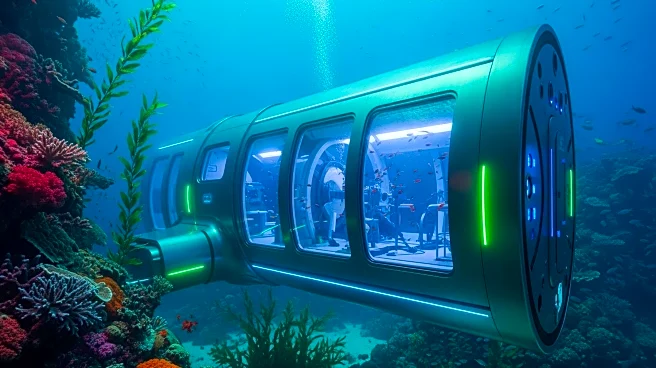What's Happening?
DEEP, an international design and engineering organization, is set to launch Vanguard, a revolutionary undersea habitat designed to advance marine science. Vanguard, located in Florida, will provide a living and working environment for researchers on the
ocean floor. The habitat, roughly the size of a shipping container, aims to facilitate extended underwater stays for scientists, enabling long-term research and exploration. This initiative marks a significant step forward in undersea habitation, a field that has seen little development since the 1980s. Vanguard is equipped to withstand category 5 hurricanes and incorporates advanced engineering innovations to ensure safety and comfort for its occupants.
Why It's Important?
The launch of Vanguard represents a major advancement in marine science, offering researchers unprecedented access to the ocean's depths. This initiative could lead to significant scientific discoveries, as the ocean remains largely unexplored. By providing a stable and comfortable environment for long-term underwater research, Vanguard could enhance our understanding of marine ecosystems and contribute to the development of new technologies. The project also highlights the potential for sustainable living and working environments in extreme conditions, which could have broader implications for future space exploration and other remote habitats.
What's Next?
Following its initial commissioning in Florida, Vanguard will undergo testing before being deployed to a yet-to-be-announced location. DEEP plans to expand its undersea habitat offerings with the development of Sentinel, a larger multi-module habitat. The success of Vanguard could pave the way for more extensive undersea research facilities, attracting scientists from various institutions to collaborate on marine studies. This could lead to increased investment in marine science and technology, further advancing our understanding of the ocean and its resources.
Beyond the Headlines
Vanguard's development also raises ethical and environmental considerations, such as the impact of long-term human presence on marine ecosystems. The project could influence future policies on ocean conservation and sustainable exploration practices. Additionally, the collaboration between engineering and design experts in creating a comfortable living space underwater may inspire innovations in other fields, such as architecture and interior design for extreme environments.















